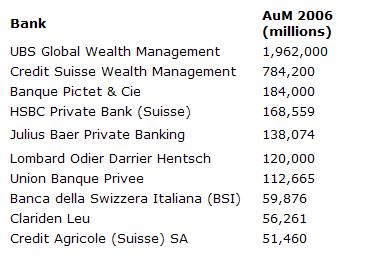Strategy
Bigger Banks Do Better - Swiss Banking Institute Survey

The Swiss Banking Institute, a department of the University of
Zurich has published its biennial Private Banking Survey. The
report, co-authored by Dr Teodoro Cocca and Dr Hans Geiger, is
based on analysis of 253 institutions focusing on private banking
from 11 countries and looks at data from 1990 to 2006. 2,176
in-house funds were also analysed. On the whole the news is
pretty up-beat. When compared to 2004, cost/income ratios are
down across the board and return on equity is up in every country
surveyed, continuing the trend seen since 2002. The larger
players have increased their share of the market based on assets
under management. The top 20 private banks now hold 16 per cent
of the market up from 15.4 per cent in 2005. According to the
survey, the biggest single player is UBS Global Wealth Management
which has 4.3 per cent of the market – hardly a dominant
position. Switzerland maintains an edge as the leading country
for private banking with the highest adjusted return on equity
and a fairly tight control on personnel costs which were
surpassed by costs in the US for the first time in 2006. Revenue
per employee grew for the fourth year in a row as it did in
nearly every country, reflecting the strong market conditions of
the past few years. Overall, Switzerland and Liechtenstein are
tied in first place in the rankings based on financial metrics.
Where the survey presents a rare insight is in its second section
of research. Taking banks’ in-house funds as a proxy for their
investment strategies, the survey attempts to report on the
success of various private banks in managing client money. These
returns are reported in bar charts that show the absolute returns
over all investment fund categories for each bank, grouped by
country. During 2006, no bank achieved a negative stock fund
performance. The averages over all countries show that clients
with stock funds received on average 7.02 per cent higher returns
in comparison to a mixed investment fund portfolio. And last
year, on average, banks outperformed their benchmark (0.65 per
cent) and therefore managed to create sustainable value for their
clients. In terms of investment performance there was no clear
winning country although the Nordic countries put in a general
strong showing. Switzerland was mid-range and the survey thus
suggests that it is individual manager selection that is vital
and the country of operation is probably not so important. The
trend to mergers in the industry will be enhanced by the finding
that size in terms of AuM has a direct correlation to
profitability. In particular the survey reports three facts: •
The relative and absolute performance of investment funds has a
significant positive correlation with the growth of AuM. • Large
banks appear to have better risk-adjusted returns over a long
period. • A uniform picture of the relations between
profitability, efficiency and performance can be discerned. So
bigger banks with more expertise do better than the boutiques.
Unless, of course, you are talking about THE boutique! No
generalism is true, after all. And then towards the back of the
report is a real nugget. The section “Focus Switzerland” provides
a plethora of data on the Swiss market, including the AuM figures
for banks that I have never known publish such figures before.
The list of the top ten banks by AuM are shown below.  .
.